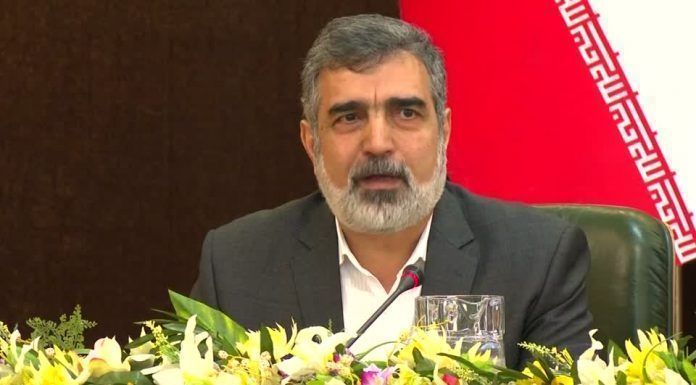By John Irish and Parisa Hafezi
PARIS/DUBAI, Sept 3 (Reuters) – France has proposed offering Iran about $15 billion in credit lines until year-end if Tehran comes fully back into compliance with its 2015 nuclear deal, a move that hinges on Washington not blocking it, Western and Iranian sources said.
French Foreign Minister Jean-Yves le Drian said talks on the credit arrangement, which would be guaranteed by Iranian oil revenues, were continuing, but U.S. approval would be crucial.
The idea is “to exchange a credit line guaranteed by oil in return for, one, a return to the JCPOA (Iran nuclear deal) …and two, security in the Gulf and the opening of negotiations on regional security and a post-2025 (nuclear programme),” Le Drian told reporters. “All this (pre)supposes that President Trump issues waivers.”
European leaders have struggled to dampen brewing confrontation between Tehran and Washington since U.S. President Donald Trump pulled out of the deal, which assures Iranaccess to world trade in return for curbs on its nuclear programme.
[aesop_image img=”https://kayhanlife.com/wp-content/uploads/2019/08/TRUMP-MACRON-009900009.jpg” panorama=”off” credit=”FILE PHOTO: French President Emmanuel Macron and President Donald Trump participate in a G-7 Working Session on the Global Economy, Foreign Policy, and Security Affairs the G-7 summit in Biarritz, France August 25, 2019. Andrew Harnik/Pool via REUTERS” align=”center” lightbox=”on” captionsrc=”custom” captionposition=”left” revealfx=”off” overlay_revealfx=”off”]
The United States reimposed sanctions on Iran last year and tightened them sharply this year. Iran has responded by breaching some of the limits on nuclear material in the deal and has set a deadline for Thursday to scale back its nuclear commitments further unless the Europeans keep their promises to salvage the deal.
For the United States to permit a credit line for Iran would contradict its stated policy of imposing “maximum pressure” to force Tehran to rein in its nuclear and missile programs as well as what Washington views as its destabilizing regional behavior.
A U.S. State Department spokeswoman referred queries about France’s proposal to the White House, which did not immediately respond to a request for comment.
French President Emmanuel Macron has spent the summer trying to create conditions that would bring the sides back to the negotiating table. At a G7 meeting in France last month, Trump appeared open to the idea of credit lines, though U.S. officials later ruled out lifting sanctions as a condition for new talks.
An Iranian delegation was in Paris on Monday, including oil and finance officials, for talks to fine-tune details of credit lines that would give Iran some respite from sanctions that have crippled its economy and cut off its oil exports.
“The question is to know whether we can reach this $15 billion) level, secondly who will finance it, and thirdly we need to get at the very least the tacit approval of the United States. We still don’t know what the U.S. position is,” said a source aware of the negotiations.
A senior Iranian official familiar with the negotiations said: “France has offered the credit line of $15 billion but we are still discussing it. It should be guaranteed that we will have access to this amount freely and also Iran should be able to sell its oil and have access to its (own) money.”
A second Iranian official said: “Although the EU and particularly France have goodwill, they should convince the U.S. to cooperate with them … If not, Iran is very serious about decreasing its nuclear commitments. There is no logic to respect the (2015) deal, if it has no benefits for us.”
A European diplomatic source confirmed the $15 billion figure. Le Drian did not confirm the figure, saying it was an Iranian number.
“The Iranians have a real desire for $15 billion, but the ball is in their court. When (Iranian President Hassan) Rouhani says I’ll never meet President Trump, the only consequence of that is that Iran won’t get $15 billion,” said a French diplomatic source, adding that further violations of the accord by Iran would be the “wrong signal” to send.
LE MAIRE IN WASHINGTON
French Finance Minister Bruno Le Maire met U.S. Treasury Secretary Steven Mnuchin in Washington on Tuesday but a U.S. Treasury statement about the meeting made no mention of Iran.
It said the ministers reiterated their commitment to work together to reach a multilateral solution “on international taxation by early 2020,” a reference to an unrelated dispute over the taxation of tech companies.
Rouhani said Iran would never hold bilateral talks with the United States but said that if all U.S. curbs imposed on Iran were lifted, Washington could join multilateral talks between Tehran and the other parties to the 2015 pact.
The Trump administration says the nuclear deal is deficient as many of its terms expire after a decade and it does not cover non-nuclear issues such as Iran‘s ballistic missile programme and its support of proxy forces around the Middle East.
Behrouz Kamalvandi, spokesman for the Atomic Energy Organization of Iran (AEOI), said on Tuesday that Iran was capable of resuming enrichment of uranium to 20% fissile purity within two days. Purity of 20% is considered an important intermediate stage on the road to producing the 90% pure fissile uranium needed for an atomic bomb.
(Reporting by John Irish and Parisa Hafezi with additional reporting by Tuqa Khalid in Dubai and Arshad Mohammed in Washington Editing by Mark Heinrich, William Maclean and Lisa Shumaker)


